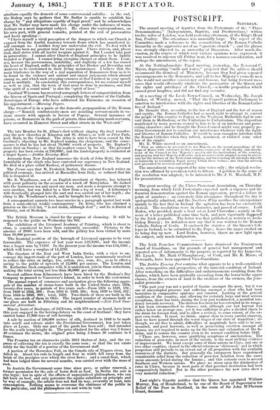The great meeting of the Ulster Protestant Association, on Thursday
morning, from which Irish Protestants expected such a vigorous and in- fluential demonstration against the Roman aggression, proved a failure in point of numbers : an extremely thin attendance throughout the day is apologetically admitted, and the .Northern Whig ascribes the circumstance mainly to the fact that in Ireland the agitation has been too exclusively clerical. The resolutions were in character, and passed of course. Lord Roden, who presided, made a dead set at Lord Clarendon ; mainly on the score of a letter published some time back, and now vigorously dismissed by the Irish journals. The letter was first published as written to-Arch- bishop Murray ; its defenders now say that it was written to the Roman Catholic Bishop of Corfu. It enclosed the statutes of the Queen's Col- leges in Ireland, to be submitted to the Pope; hence the anger excited on its being dug up now. Lord Roden, however, threw no new light upon the subject, only much indignation.
The Irish Poor-law Commissioners have dismissed the Ennistymon Board of Guardians, on the grounds of general bad management and repeated acts of inhumanity to the paupers, as reported by the Inspector, Mr. Lynch. Mr. Mark O'Shaughnessy, of Cork, and Mr. K. Moore, of Newcastle, have been appointed Vice-Guardians.
The Dublin Evening _Post contains what appears to be a well-considered view, retrospective and prospective, of the material condition of Ireland. After remarking on the difficulties and embarrassments resulting from the famine, which have been gradually ascending from the lower to the upper classes, from the owners of land to the creditors of the owners, the jour- nalist proceeds—
"The past year was not a period of famine amongst the poor, but it was one of unexampled pressure and suffering amongst a class who had been heretofore in comparative opulence and comfort. Looking at the general condition of the country, and allowing for certainly large and most serious exceptions, there has been, during the year just terminated, a manifest ten- dency towards recovery. The distress has been far less extended in its range ; it has been circumscribed to classes; and, although our last harvest was rather below an average one, yet it was sufficient to give a decided check to the drain for foreign food, and to allow a revival, to some extent, of the ex- port corn-trade. It must, we think, appear clear to every careful observer, that we have passed through the worst stages of our state of transition ; al- though, we are free to admit, difficulties of magnitude have still to be sur- mounted, and good harvests, as well as persevering exertion amongst all classes, are yet required to make up for the losses and exhaustion of the fa- mine, and to restore the country even to its normal condition before 1846. "There are, however, sonic gratifying symptoms of amelioration. The reduction of poor-rate, in most of the unions, is the most striking evidence of improvement. We must except some of those unions in Clare, and one or two other counties, classed in the official returns as distressed,' and in which pauperism still prevails to an extent out of all proportion with the available resources of the districts. But generally the ratepayers have experienced considerable relief from the reduction of poor-law taxation from the enor- mous amounts levied during the famine; and this extends even to several Southern and Western unions. We place no stress upon the diminution of rates in Ulster, because in most parts of that province destitution had been comparatively limited. But in the other provinces the new rates show a very material reduction."






























 Previous page
Previous page